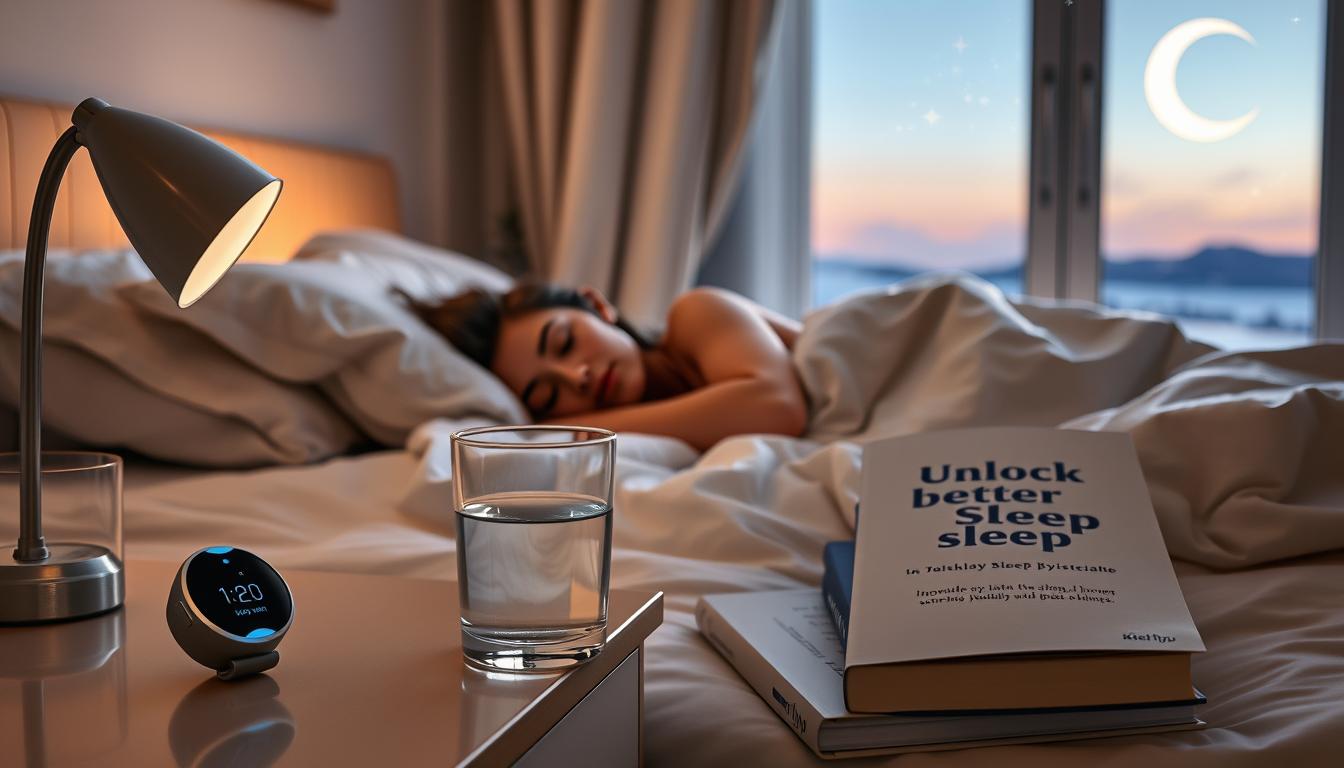I am a participant in the Amazon Services LLC Associates Program, an affiliate advertising program designed to provide a means for sites to earn advertising fees by advertising and linking to Amazon.com and affiliated sites. This post contains affiliate links. Privacy Policy
Unlock Better Sleep: Tips to Improve Sleep Quality
“Sleep is the golden chain that ties health and our bodies together.” – Thomas Dekker. This quote shows how important sleep is for our health. You might have trouble sleeping and feel tired in the morning. But, there are ways to make your sleep better.
It’s key to have healthy sleep habits to wake up feeling good. Simple sleep hygiene tips can greatly improve your sleep quality. This means making your sleep space right and using natural remedies for better sleep.

By the end of this article, you’ll know many sleep quality techniques. You’ll be ready for a good night’s sleep. Let’s dive into these tips to help you sleep better.
Best brain supplement!
Key Takeaways
- Establish a consistent sleep schedule
- Create a sleep-conducive environment
- Avoid caffeine and electronics before bedtime
- Try relaxation techniques for better sleep
- Incorporate natural remedies into your bedtime routine
The Science of Sleep and Its Impact on Health
Sleep is more than just rest. It’s a complex process that impacts our health in many ways. It involves different stages and cycles that are vital for our well-being.
Understanding Sleep Cycles and Stages
Sleep has various stages, including REM and non-REM sleep. Non-REM sleep has three stages, each with unique brain wave patterns. Knowing these cycles can help improve your sleep quality.
- Stage 1: Transition from wakefulness to sleep.
- Stage 2: Light sleep before entering deeper sleep.
- Stage 3: Deep sleep, crucial for physical recovery.
- REM Sleep: Associated with vivid dreams and memory consolidation.
The Consequences of Sleep Deprivation
Not getting enough sleep can harm your health. It can lead to poor thinking, mood swings, and a higher risk of diseases like diabetes and heart disease. Coping with stress and using stress management techniques can help lessen these effects.
Some of the main consequences include:
- Impaired cognitive function and decision-making.
- Increased risk of accidents and injuries.
- Mood disorders, such as depression and anxiety.
How to Improve Sleep Quality Through Your Environment
Turning your bedroom into a sleep sanctuary is key to better sleep. It should be a place that helps you relax and get ready for sleep.
Creating the Ideal Bedroom Setting
A well-designed bedroom can greatly improve your sleep. This means choosing the right furniture and keeping the space organized.
Choosing the Right Mattress and Pillows
Getting a comfortable mattress and pillows is crucial. A good mattress supports your body’s alignment, and pillows should keep your spine straight.
Optimal Bedroom Organization
Keep your bedroom tidy and organized. A clean space helps you relax and lowers stress.
| Bedroom Element | Ideal Condition | Benefits |
|---|---|---|
| Mattress | Comfortable, supportive | Proper spinal alignment, reduced back pain |
| Pillows | Supportive, comfortable | Improved sleep quality, reduced neck strain |
| Organization | Clutter-free, tidy | Reduced stress, enhanced relaxation |
Managing Light, Temperature, and Noise
Controlling environmental factors is key to better sleep.
Light Control Strategies
Use blackout curtains or blinds to block light. Darkness tells your body it’s time to sleep.
Finding Your Ideal Sleep Temperature
Most people sleep best in a cooler room, around 60-67°F (15-19°C). Try different temperatures to find what works for you.
Soundproofing and White Noise Solutions
Use earplugs, white noise machines, or soundproofing materials to block out noise.
By using these tips, you can make your sleep environment better. This leads to better sleep and overall health.
Establishing a Consistent Sleep Schedule
Improving sleep quality starts with a consistent sleep schedule. This means setting regular times for sleep and waking. It helps your body’s internal clock and boosts health. A regular sleep schedule also helps manage stress and lowers the risk of sleep disorders.
Setting Regular Sleep and Wake Times
To start, set the same sleep and wake times every day. This includes weekends. Being consistent helps your body get into a sleep routine. It makes falling asleep and staying asleep easier.
Use a sleep diary or a mobile app to track your sleep. This helps you see where you can improve.
Here is a sample sleep schedule table:
| Day | Bedtime | Wake-up Time |
|---|---|---|
| Monday | 10:00 PM | 6:00 AM |
| Tuesday | 10:00 PM | 6:00 AM |
| Wednesday | 10:00 PM | 6:00 AM |
Managing Weekend Sleep Without Disrupting Your Routine
Weekends can be tough for sleep, especially if you stay up late or sleep in. But, it’s key to stick to your regular sleep schedule. Set an alarm for the same time as weekdays and avoid naps.
If you need a nap, keep it short, under 30 minutes. This way, you can still enjoy your weekend without messing up your sleep routine.
Keeping a consistent sleep schedule improves your sleep quality. You’ll wake up feeling refreshed and ready to tackle the day. This leads to better stress management and overall well-being.
Nutrition and Dietary Habits for Better Sleep
What you eat and when you eat can really affect your sleep. Eating a balanced diet with sleep-promoting foods can enhance sleep quality naturally. Good nutrition helps control sleep patterns, and smart food choices are key to better sleep.
Sleep-Promoting Foods and Nutrients
Some foods and nutrients help you sleep better. Foods high in tryptophan, like turkey and chicken, boost serotonin and melatonin. These hormones control sleep. Also, complex carbs like whole grains and minerals in nuts and greens help too.
| Food | Nutrient | Benefit |
|---|---|---|
| Turkey, Chicken | Tryptophan | Promotes serotonin and melatonin production |
| Whole Grains | Complex Carbohydrates | Increases serotonin levels |
| Nuts, Leafy Greens | Magnesium, Potassium | Relaxes muscles and promotes calmness |
Beverages and Substances to Avoid Before Bed
Stay away from drinks and substances that mess with sleep. Caffeine and nicotine keep you awake. Alcohol might make you sleepy at first but can mess with your sleep later.
- Caffeine: Found in coffee, tea, and some soft drinks
- Nicotine: Found in tobacco products
- Alcohol: Can disrupt sleep patterns
Strategic Meal Timing for Optimal Sleep
Eating a big meal before bed can cause discomfort and indigestion. It’s best to eat 2-3 hours before bedtime. A light snack with sleep-promoting nutrients is okay if you’re still hungry.
Evening Routines That Enhance Sleep Quality
Improving sleep quality starts with a good evening routine. It should include stress management and calming activities. As bedtime approaches, your body needs a clear signal to sleep. A consistent routine is key.
Relaxation and Stress Management Techniques
Relaxation techniques are crucial for stress management and sleep preparation. Adding these to your evening routine can greatly improve sleep.
Meditation and Breathing Exercises
Meditation and breathing exercises calm the mind and reduce stress. They make falling asleep easier. Regular use can improve sleep quality.
Progressive Muscle Relaxation
Progressive muscle relaxation involves tensing and relaxing muscles. It releases physical tension, leading to a restful night’s sleep.
Digital Detox Strategies
Today’s digital world makes it hard to avoid screens before bed. But, the blue light from devices can disrupt sleep. A digital detox before bed is a simple way to enhance sleep.
“The blue light from smartphones, tablets, and computers can lower melatonin levels, the sleep hormone.”
American Academy of Sleep Medicine
Calming Activities to Prepare Your Body for Sleep
Calming activities before bed tell your body it’s time to sleep. Reading, listening to soothing music, or taking a warm bath can prepare you for a good night’s sleep.
- Reading a book
- Listening to calming music
- Taking a warm bath
| Activity | Benefits |
|---|---|
| Reading | Distracts from daily stress, promotes relaxation |
| Listening to Music | Calms the mind, reduces stress |
| Warm Bath | Relaxes muscles, promotes calm |
By adding these evening routines to your daily life, you can greatly improve your sleep. You’ll wake up feeling refreshed and ready to go.
Conclusion: Your Path to Consistently Restorative Sleep
You now know how crucial sleep is and how to make it better. To improve sleep, create a good sleep space, stick to a sleep schedule, and eat right. These steps help a lot.
For better sleep, try relaxation and avoid screens before bed. Also, manage stress well. It affects how well you sleep.
Use these tips every day to sleep better. Being consistent, even on weekends, really helps.
Begin your path to better sleep tonight. With effort, you’ll see big improvements in your health and mind.
FAQ
What are some effective stress management techniques to improve sleep quality?
To manage stress and improve sleep, try relaxation techniques like meditation and deep breathing. Yoga is also great for stress relief and better sleep.
How can I create a sleep-conducive environment?
Make your bedroom dark, quiet, and cool for sleep. Use blackout curtains and earplugs if needed. Choose a comfy mattress and pillows. Keep electronic devices out of your bedroom.
What are some sleep-promoting foods and nutrients?
Foods like turkey, chicken, and fish help promote sleep because they have tryptophan. Cherries and walnuts are good for melatonin. Eating a balanced diet with carbs, proteins, and fats also supports sleep.
How can I manage my sleep schedule on weekends?
Stick to your regular sleep schedule on weekends. Going to bed and waking up at the same time helps your body’s clock. Avoid sleeping in late to prevent sleep disruptions.
What are some digital detox strategies to enhance sleep quality?
Avoid screens for an hour before bed. Use blue light filtering glasses or apps. Keep devices out of your bedroom. Relax with reading or calming music before sleep.
How can I improve my sleep quality naturally?
Keep a regular sleep schedule and create a sleep-friendly environment. Use relaxation techniques and eat sleep-promoting foods. Avoid stimulating activities before bed.
What are some stress relief strategies that can help with sleep?
Try yoga, tai chi, or meditation to reduce stress and relax. Journaling, listening to calming music, or a warm bath can also help prepare for sleep.
How can I optimize my bedroom for better sleep?
Make your bedroom dark, quiet, and cool. Choose a supportive mattress and pillows. Keep devices and clutter out of your bedroom.
I am a participant in the Amazon Services LLC Associates Program, an affiliate advertising program designed to provide a means for sites to earn advertising fees by advertising and linking to Amazon.com and affiliated sites. This post contains affiliate links. Privacy Policy


